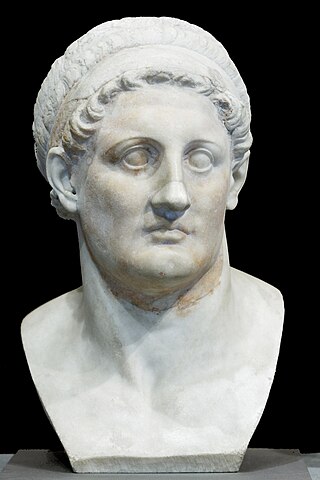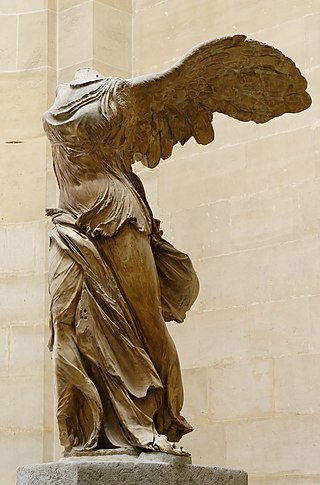Related Research Articles

The Seleucid Empire was a Hellenistic power in West Asia. It was founded in 312 BC by the Macedonian general Seleucus I Nicator, following the division of the Macedonian Empire founded by Alexander the Great, and ruled by the Seleucid dynasty until its annexation by the Roman Republic under Pompey in 63 BC.
The 4th century BC started the first day of 400 BC and ended the last day of 301 BC. It is considered part of the Classical era, epoch, or historical period.

The 2nd century BC started the first day of 200 BC and ended the last day of 101 BC. It is considered part of the Classical era, although depending on the region being studied, other terms may be more suitable. It is also considered to be the end of the Axial Age. In the context of the Eastern Mediterranean, it is the mid-point of the Hellenistic period.

Year 323 BC was a year of the pre-Julian Roman calendar. At the time, it was known as the Year of the Consulship of Longus and Cerretanus. The denomination 323 BC for this year has been used since the early medieval period, when the Anno Domini calendar era became the prevalent method in Europe for naming years.
This article concerns the period 149 BC – 140 BC.

This article concerns the period 329 BC – 320 BC.
This article concerns the period 319 BC – 310 BC.

This article concerns the period 309 BC – 300 BC.
This article concerns the period 289 BC – 280 BC.
This article concerns the period 169 BC – 160 BC.
This article concerns the period 179 BC – 170 BC.
Year 281 BC was a year of the pre-Julian Roman calendar. At the time it was known as the Year of the Consulship of Barbula and Philippus. The denomination 281 BC for this year has been used since the early medieval period, when the Anno Domini calendar era became the prevalent method in Europe for naming years.

Ptolemy I Soter was a Macedonian Greek general, historian and successor of Alexander the Great who went on to found the Ptolemaic Empire centered on Egypt and led by the Ptolemaic dynasty from 305 BC – 30 BC. Ptolemy was basileus and pharaoh of Ptolemaic Egypt from 305/304 BC to his death, during which time Egypt became a thriving bastion of Hellenistic civilization and Alexandria a great seat of Greek culture.

Seleucus I Nicator was a Macedonian Greek general, officer and successor of Alexander the Great who went on to found the eponymous Seleucid Empire, led by the Seleucid dynasty. In the power struggles that followed Alexander's death, Seleucus rose from being a secondary player to becoming total ruler of Asia Minor, Syria, Mesopotamia, and the Iranian Plateau, assuming the title of basileus (emperor). The Seleucid Empire was one of the major powers of the Hellenistic world, until it was overcome by the Roman Republic and Parthian Empire in the late second and early first centuries BC.
Perdiccas was a general of Alexander the Great. He took part in the Macedonian campaign against the Achaemenid Empire, and, following Alexander's death in 323 BC, rose to become supreme commander of the imperial army, as well as regent for Alexander's half brother and intellectually disabled successor, Philip Arridaeus.

In classical antiquity, the Hellenistic period covers the time in Mediterranean history after Classical Greece, between the death of Alexander the Great in 323 BC to the death of Cleopatra VII followed by the emergence of the Roman Empire, as signified by the Battle of Actium in 31 BC and the conquest of Ptolemaic Egypt the following year. The Ancient Greek word Hellas was gradually recognized as the name for Greece, from which the word Hellenistic was derived. "Hellenistic" is distinguished from "Hellenic" in that the latter refers to Greece itself, while the former encompasses all ancient territories under Greek influence, in particular the East after the conquests of Alexander the Great.

The Diadochi were the rival generals, families, and friends of Alexander the Great who fought for control over his empire after his death in 323 BC. The Wars of the Diadochi mark the beginning of the Hellenistic period from the Mediterranean Sea to the Indus River Valley.

The Wars of the Diadochi, or Wars of Alexander's Successors, were a series of conflicts that were fought between the generals of Alexander the Great, known as the Diadochi, over who would rule his empire following his death. The fighting occurred between 322 and 281 BC.

The Syrian Wars were a series of six wars between the Seleucid Empire and the Ptolemaic Kingdom of Egypt, successor states to Alexander the Great's empire, during the 3rd and 2nd centuries BC over the region then called Coele-Syria, one of the few avenues into Egypt. These conflicts drained the material and manpower of both parties and led to their eventual destruction and conquest by Rome and Parthia. They are briefly mentioned in the biblical Books of the Maccabees.

The Ptolemaic Kingdom or Ptolemaic Empire was an Ancient Greek state based in Egypt during the Hellenistic period. It was founded in 305 BC by Ptolemy I Soter, a companion of Alexander the Great, and ruled by the Ptolemaic dynasty until the death of Cleopatra VII in 30 BC. Reigning for nearly three centuries, the Ptolemies were the longest and final dynasty of ancient Egypt heralding a distinctly new era for religious syncretism and the blending of a new Greco-Egyptian culture.
References
- ↑ "Geography at about.com". Archived from the original on August 18, 2016. Retrieved March 1, 2006.